Africa’s VC landscape is heating up in 2025 after a tough 2024. Key trends include:
- Funding Rebound: Q1 2025 saw $1B invested across 109 deals, signaling renewed investor confidence after a 25% drop in 2024.
- Fintech Dominance: Fintech leads with 42% of total deal value, while AI and climate-tech are gaining traction.
- Big Four Markets: Kenya, Nigeria, Egypt, and South Africa continue to attract 84% of funding.
- Local Investors Rising: African diaspora funds, angel syndicates, and pension-backed initiatives are becoming more active.
- Sector-Specific Funds: Focus areas include climate-tech, agritech, and infrastructure tech.
Here’s a breakdown of the top VC funds actively shaping Africa’s innovation scene:
- Partech: €2.5B under management; focuses on fintech, e-commerce, and education.
- Raba Partnership: Early-stage investments in fintech and digital infrastructure.
- TheVentureCity: Supports fintech, healthtech, and AI with $145M globally.
- Technology Innovation Agency (TIA): South African government-backed, multi-sector focus.
- Zedcrest Capital: Targets fintech and financial services with $10M pre-Series A fund.
- Azur Partners: Morocco-focused with $7.5M average deal size.
- Jozi Angels: South African angel network backing early-stage startups.
- Future Africa: Invests in pre-seed/seed-stage startups using tech to solve major challenges.
- 4Di Capital: Focuses on fintech, insure-tech, and healthtech.
- EchoVC Partners: Broad sector focus, supporting underrepresented founders.
Key Takeaway: Africa’s VC scene is evolving, with fintech leading the charge and new sectors like AI and climate-tech gaining interest. Local investors and sector-specific funds are shaping a more resilient startup ecosystem.
What to Invest in Africa in 2025 | Insights from Leading VCs at AfricArena Lagos Summit

Partech stands out as one of Africa’s most active venture capital funds, managing an impressive €2.5 billion across a portfolio of 220 companies spanning 40 countries. With a broad investment lens, the fund zeroes in on startups leveraging technology to tackle significant market opportunities across the continent.
Investment Focus and Strategy
Partech Africa primarily invests in startups from the seed stage through Series C, with investment sizes ranging from €0.5 million to €5 million. Its second Africa-focused fund, which closed at €280 million in December 2024, plans to support 20 to 25 startups. The fund concentrates on sectors like financial inclusion (fintech and insurtech), e-commerce, entertainment, education, mobility, supply chain solutions, and the digitization of Africa’s informal economy.
Recent Investment Activity
In May 2025, Partech made several high-profile investments:
- Co-led a $13 million pre-Series C round in Money Fellows, an Egyptian platform for group savings.
- Participated in Carrot Credit’s $4.2 million seed round, backing the Nigerian lending platform.
- Led the equity portion of Nawy’s $75 million funding round for the Egyptian proptech company, which included $52 million in equity and $23 million in debt.
- Co-led AURA’s $15 million Series B round, supporting the South African emergency services marketplace.
Commenting on their investment in Money Fellows, Cyril Collon, General Partner at Partech, shared:
“We are proud to support Money Fellows in their efforts to bring digital financial services to more people across Africa. Their platform is uniquely positioned to leverage traditional savings practices while incorporating modern technology to drive financial inclusion on a massive scale”.
Notable Portfolio Companies
Partech’s first Africa-focused fund backed 17 startups, many of which have become leaders in their respective industries. These include:
- TradeDepot: A Nigerian platform revolutionizing FMCG distribution across Africa.
- Yoco: A South African company providing point-of-sale solutions tailored for small businesses.
- Wave: Senegal’s top mobile money provider.
- Revio: A South African payment orchestration platform, where Partech co-led the seed round.
These companies demonstrate the fund’s ability to identify and support startups with transformative potential.
Application Process and Selection Criteria
Entrepreneurs aiming for Partech funding should craft a detailed pitch deck that clearly outlines their market leadership potential. The fund prioritizes startups with core operations in Africa and a clear strategy to utilize Partech’s global network and operational expertise for scaling. With offices in Dakar, Nairobi, Dubai, and Paris, Partech offers localized support to founders. As General Partner Tidjane Deme explained:
“Being on the ground enables us to better understand local contexts, support founders more closely, and navigate regulatory and operational environments with more agility”.
Partech also integrates a gender lens into its investment strategy and adheres to sustainable development and governance best practices, reflecting the increasing focus on responsible investing within Africa’s startup ecosystem.
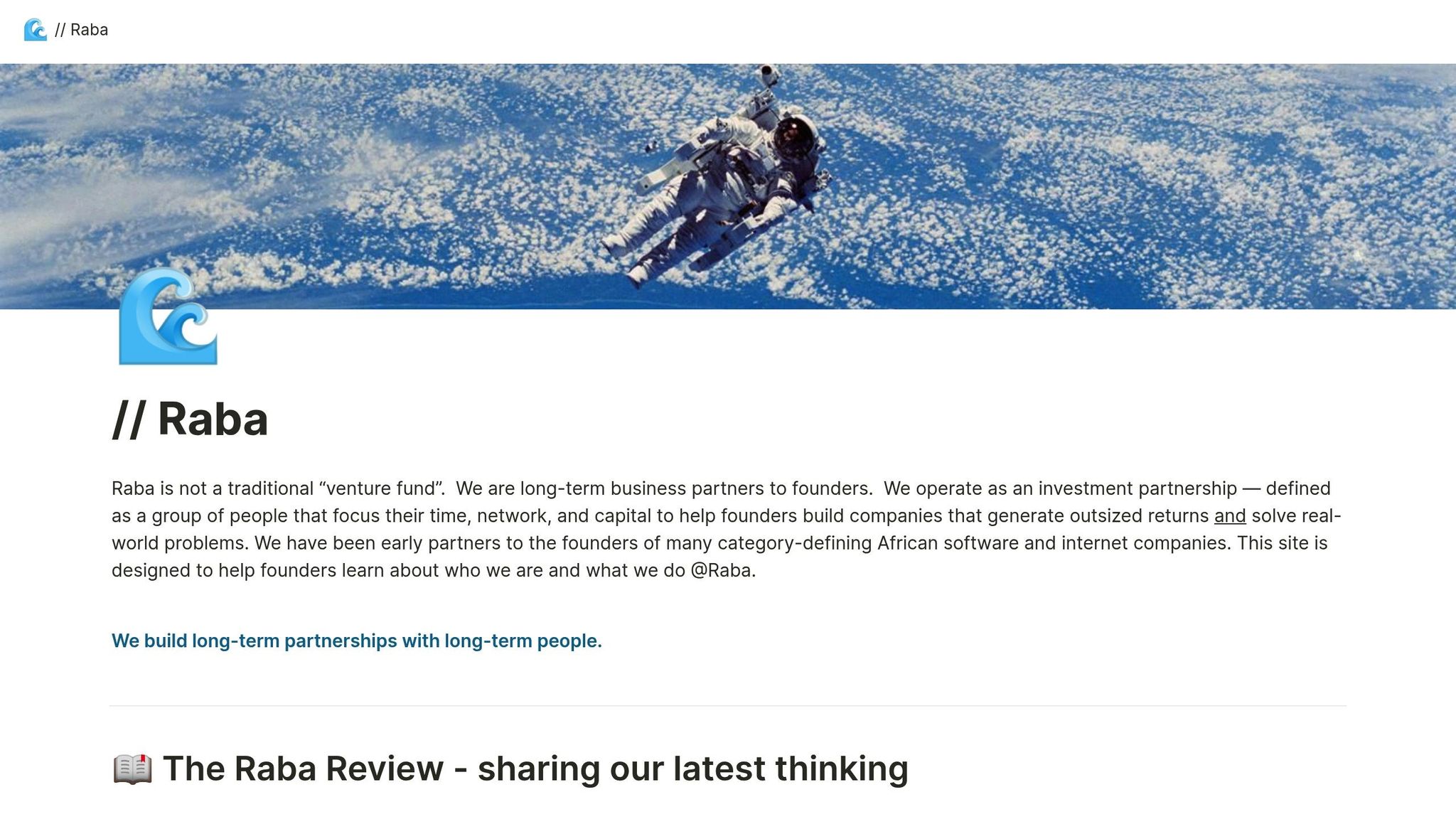
Raba Partnership stands out in Africa’s growing venture capital landscape with a distinct, founder-focused approach. Unlike conventional VC firms, Raba emphasizes building lasting relationships with entrepreneurs instead of operating as a typical fund. The firm concentrates on sectors that are shaping Africa’s digital and financial evolution.
Investment Focus and Strategy
Raba Partnership backs early-stage African startups, from seed to Series A, with investments ranging from $100,000 to $3 million. Their primary focus lies in software and internet-driven companies that streamline capital flow and ensure the delivery of essential products.
As Raba Partnership explains:
“We partner with founders building software and internet-first companies. We get involved early – during a time when we can have outsized impact. Our focus is on companies that facilitate the efficient movement of capital and essential products – the rails that enable other businesses to be built”.
This philosophy drives their investments in fintech, energy, and emerging digital infrastructure, aligning with their vision for long-term partnerships.
Recent Investment Activity
Raba Partnership has been actively supporting transformative ventures. In May 2025, they invested $15.7 million in Thndr, an Egyptian investment platform, during its Series A round. Earlier that year, in March, they participated in Stitch’s $55 million Series B round, bolstering the South African fintech’s open banking and payment infrastructure expansion.
Their 2024 investments included $4 million in Swypex, an Egyptian fintech, during its seed round in May, and $1.5 million in Cleva’s seed round in January.
Notable Portfolio Companies
The Raba portfolio showcases a keen eye for startups addressing Africa’s pressing needs. Stitch, founded in 2019, has become a major player in South Africa, focusing on open banking and payment systems. With Raba’s support, Stitch expanded its reach, including acquiring Exipay to strengthen its capabilities.
Octo, an Egyptian platform for digital payments and credit, serves the growing demand for accessible financial tools in North Africa, offering flexible transaction options for small businesses and consumers alike. Another standout is Moment, a Nigerian fintech that underscores Raba’s pan-African investment strategy.
These companies highlight Raba’s commitment to identifying and supporting ventures with transformative potential.
Application Process and Selection Criteria
Raba Partnership’s selective approach prioritizes quality over quantity, evident in its portfolio of 26 companies. The firm values deep, long-term relationships and employs scouts across Africa to identify promising startups early.
Entrepreneurs interested in applying can reach out via email at [email protected]. Applicants should demonstrate how their business facilitates efficient capital flow or delivers essential services across the continent. As Raba Partnership puts it:
“We build long-term partnerships with long-term people”.
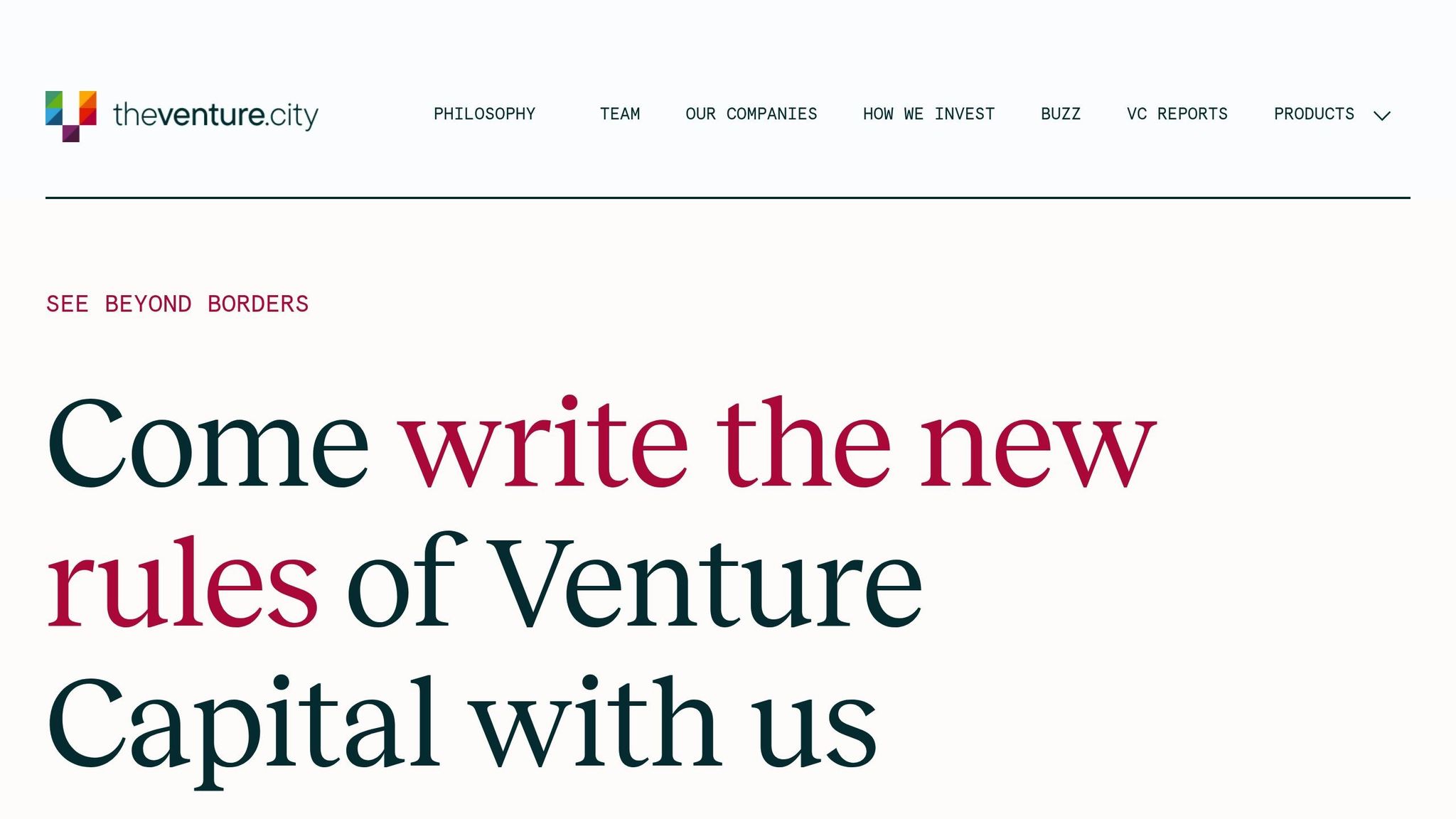
TheVentureCity is a global early-stage fund managing $145 million, actively supporting Africa’s tech ecosystem across 21 countries. This international perspective shapes its investment strategy, targeting a variety of sectors.
Investment Focus and Strategy
TheVentureCity concentrates on four main sectors: fintech, healthtech, AI/ML/Data, and B2B SaaS. This focus aligns with trends in Africa, where fintech firms made up eight of the nine unicorns in 2025. Their approach prioritizes businesses solving critical problems over those offering mere conveniences. The fund typically invests between $100,000 and $4 million in Seed and Series A rounds, with growing attention on African markets.
In their own words:
“We offer promising founders investment with bespoke data insights and operating expertise – designed for product-led growth”.
Notable Portfolio Impact
TheVentureCity’s impact on African startups is evident through its portfolio. For instance, Jobartis, a job-matching platform operating in several African countries, became Angola’s second most visited website by 2018, thanks to the fund’s backing. Similarly, 1DOC3, a health platform in Colombia, achieved over 15% monthly growth by 2018 following their involvement. Across its portfolio of over 100 companies, TheVentureCity has helped startups raise $1.2 billion in five years, with 20% of these companies being female-founded.
Application Process and Selection Criteria
TheVentureCity makes it easy for African entrepreneurs to apply. Founders can submit their pitch directly through a form on their website, summed up by their invitation: “Drop your pitch. Then let’s talk”. Their ideal candidates are resourceful, product-focused founders who rely on data-driven strategies. The fund prioritizes startups with strong growth trajectories and solutions addressing real market needs. Businesses showing over six months of double-digit growth may qualify for their accelerator program, the Garden.
General Partner Andrés Dancausa describes their approach:
“Founders gain not just capital but operational guidance, effectively extending their team during complex growth stages”.
This blend of funding and hands-on expertise makes TheVentureCity a compelling choice for African entrepreneurs looking to scale their businesses across diverse markets.

The Technology Innovation Agency (TIA) serves as South Africa’s leading government-supported driver of innovation. Established through the merger of seven entities under the Department of Science and Technology, TIA was designed to streamline support for the country’s tech ecosystem. Unlike traditional venture capital funds, TIA operates with a broader socio-economic mission, aiming to enhance local development while improving global competitiveness. This approach allows TIA to support technological advancements in a way that benefits both society and the economy.
Investment Focus and Strategy
TIA’s investment strategy revolves around eight key sectors:
- Advanced Manufacturing: Includes robotics and Industry 4.0 initiatives.
- Agriculture: Focuses on smart farming technologies and agroprocessing.
- Energy: Covers renewable energy and electric vehicle innovations.
- Health: Invests in precision medicine and digital healthcare solutions.
- ICT: Supports artificial intelligence and cybersecurity projects.
- Indigenous Knowledge Systems: Promotes traditional medicine and cannabis-related innovations.
- Industrial Biotechnology: Includes biofuels and sustainable materials.
- Natural Resources: Concentrates on sustainable mining and climate-related solutions.
To bridge the gap between early-stage innovation and commercialization, TIA provides a variety of funding options, including grants, loans, seed capital, and intellectual property (IP) guidance. For example, the Grassroots Innovation Programme offers up to R200,000 in startup grants, along with a R60,000 project fee for a 12-month period. Another key initiative, the Technology Acquisition and Deployment Fund, provides up to R1 million to support deployment activities.
Notable Portfolio Impact
TIA’s approach reflects a growing trend among African venture capital initiatives to focus on region-specific innovation. One standout success is BrewSpoon, a startup supported by TIA’s SEED Fund and developed in partnership with the Product Development Technology Station at the Central University of Technology in Bloemfontein. Launched in November 2020, BrewSpoon created a food-safe polypropylene and stainless-steel product for brewing single-cup, barista-quality filter coffee. The product is now sold nationwide through retailers like Takealot and has expanded its reach to the U.S. market.
Between 2020 and 2024, TIA’s Technology Station Programme supported over 11,000 beneficiaries, with 56% of them being youth under 35 and 45% of enterprises led by women. Additionally, TIA’s Industry Matching Fund has distributed approximately R170 million since 2019, leveraging over R1 billion across 75 investments.
Application Process and Selection Criteria
TIA offers multiple funding pathways to make the process accessible for startups. For funding requests under R1 million, applicants can expect responses within four weeks, while larger requests may take up to 26 weeks. Entrepreneurs must complete TIA’s online funding application and select from six funding instruments based on their technology’s readiness level and development stage. Collaborative applications, particularly those involving partnerships with universities or science councils, are highly encouraged to strengthen proposals.
Beyond funding, TIA connects startups with industry partners, facilitates late-stage funding for market-ready technologies, and provides ongoing innovation support programs. Entrepreneurs can stay updated on open calls for proposals and expressions of interest by visiting TIA’s website, ensuring that startups across South Africa have access to the resources they need to thrive.

Founded in 2013, Zedcrest Capital Limited has established itself as a prominent financial services firm in Africa. In 2022, the Financial Times recognized it as the fastest-growing financial services company on the continent.
Investment Focus and Strategy
Zedcrest Capital zeroes in on financial services and fintech startups, concentrating on areas like capital markets, fixed income trading, and payment solutions. The firm primarily backs early-stage companies tackling inefficiencies in African financial markets, offering investments between $250,000 and $5 million per deal.
Through its various investment vehicles, including a dedicated Ventures fund, Zedcrest has supported over 20 African startups at the pre-seed and seed stages. Among its initiatives is the $10 million “Knight Fund”, which targets pre-Series A startups.
Notable Portfolio Companies and Impact
One standout investment is Leatherback, a UK-based cross-border payments platform. In April 2022, Zedcrest led a $10 million pre-seed round for Leatherback, enabling its expansion into markets such as South Africa, Egypt, Uganda, India, and the UAE.
“As principal investors, we love opportunities where we can bring our expertise to bear. It has been rewarding to provide operational and strategic support to Leatherback in its quest to build the perfect compliance, technology, and finance infrastructure that will allow it to be the operating system of choice for the global mobility of businesses and individuals.” – Adedayo Amzat, Group Managing Director, Zedcrest Capital
Other investments include PaidHR, TalentQL, Indicina, Simpu, Julaya, and Thndr, showcasing the firm’s broad engagement within the African startup space.
Market Positioning and Strategic Approach
Zedcrest continues to adapt its investment strategy to market conditions. While the firm still invests in seed-stage startups through its first fund, it is now channeling more resources into pre-Series A opportunities.
“We’re still investing in seed from our first fund but we also going to slow down because the biggest opportunity right now will be in this pre-Series A. So now, we are dedicating $10 million to this category of slightly more mature businesses going through a rough patch because the market is very tight.” – Adedayo Amzat, founder and CEO of Zedcrest Capital
The firm’s commitment to Nigeria is evident in moves like its acquisition of RMB Nigeria Stockbrokers for between ₦400 million and ₦420 million, a step that strengthens its foothold in the local market.
Connecting with Zedcrest Capital
Zedcrest seeks startups that address specific inefficiencies in financial services, offering not just funding but also operational expertise. Entrepreneurs are encouraged to apply through the company’s official channels, with a focus on innovations that enhance capital flows within African economies. This dual focus on investment and expertise positions Zedcrest as a strong partner for startups aiming to drive lasting change in African financial markets.
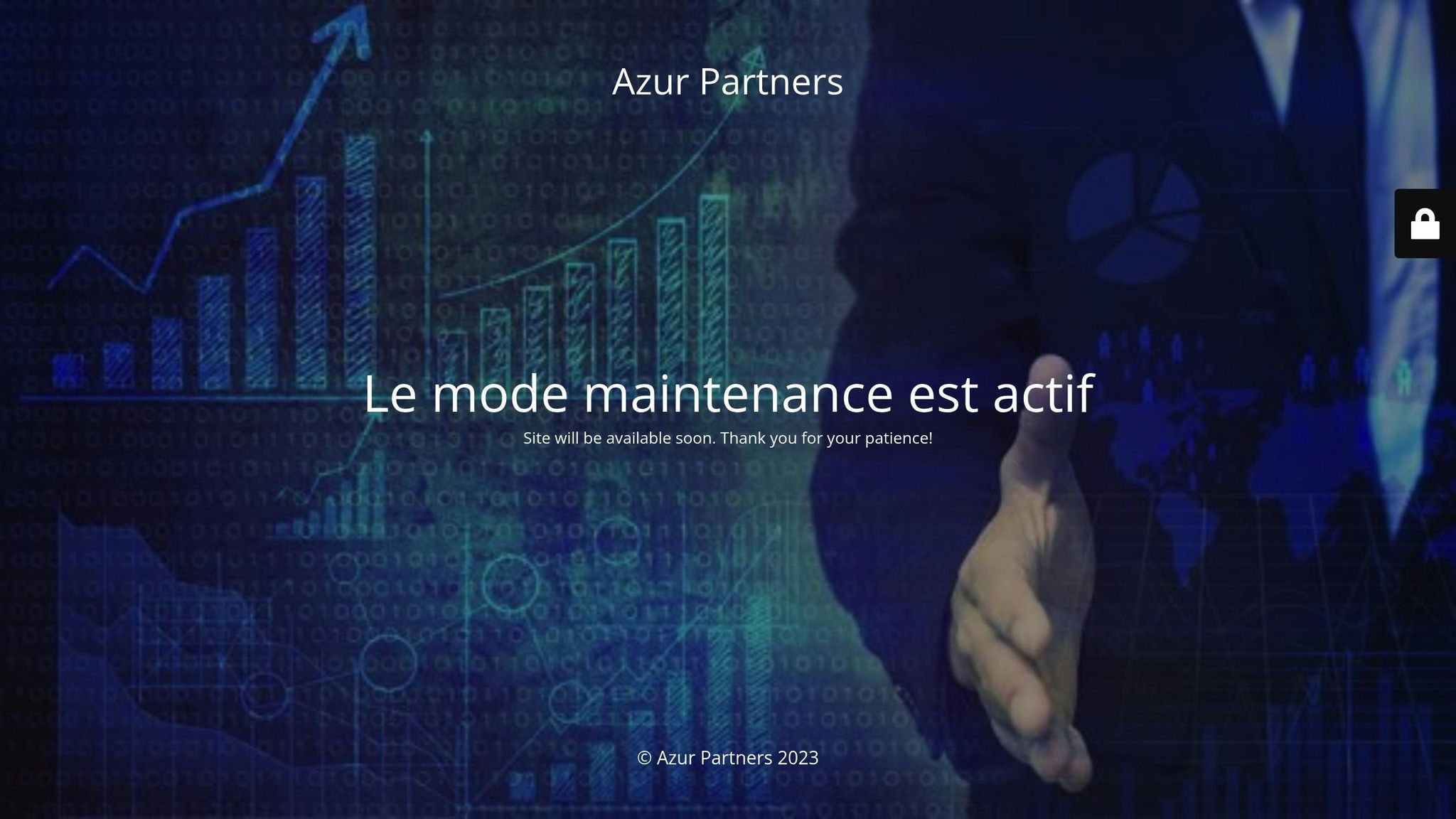
Azur Partners’ Azur Innovation Fund is making waves in Morocco’s startup scene, focusing on investments that bring fresh ideas to the North African market. By targeting innovative solutions, the fund aims to address specific challenges and unlock opportunities in the region’s growing ecosystem.
Investment Focus and Strategy
The fund primarily targets Series A investments in Morocco, with an average deal size of $7.5M. It spans multiple industries, including SaaS & AI, Fintech, Healthcare, HR Tech, Proptech, Greentech, and Mobility. Azur Partners prioritizes projects that address inefficiencies in the market, particularly within innovation and industrialization.
As of July 2025, Azur Partners has been actively investing, with two new deals closed in the past year.
Notable Portfolio Companies and Recent Deals
Azur Partners’ recent investments highlight its strategy in action. For example:
- In July 2025, the fund led a $7.5M Series A round for ORA Technologies, a Casablanca-based startup founded in 2023. This brought ORA’s total funding to $11.9M. ORA provides a versatile platform offering P2P transactions, e-commerce, on-demand services, chat, social networking, and digital wallet features.
- In September 2024, Azur Innovation Management invested $827K in Kwiks, a Moroccan HRtech company. The funding was aimed at enhancing Kwiks’ AI-powered recruitment tools, which streamline candidate screening and matching processes.
Additionally, Azur Partners launched a $35M Innovation Fund in 2020, dedicated to supporting Moroccan startups.
Market Impact and Strategic Positioning
Azur Partners works closely with Moroccan startups, helping them scale by addressing gaps in the market through technology-driven solutions. This approach is evident in the experiences of their portfolio companies. For instance, Amine SLIMANI, Founder and Managing Director of Epicerie Verte, shared:
“We realized that there was a very interesting offer in Morocco for organic products. However, these sellers found it difficult to access a market because there are very few outlets where they can properly display their products. So, we come to play this role of connecting buyers and sellers.”
Connecting with Azur Partners
Entrepreneurs seeking funding from Azur Partners should focus on how their solutions tackle critical market inefficiencies in Morocco. The fund is particularly interested in startups that use AI and technology to develop scalable business models. Companies operating in sectors like SaaS, fintech, and HR technology should emphasize how they can disrupt traditional practices while meeting local market demands.
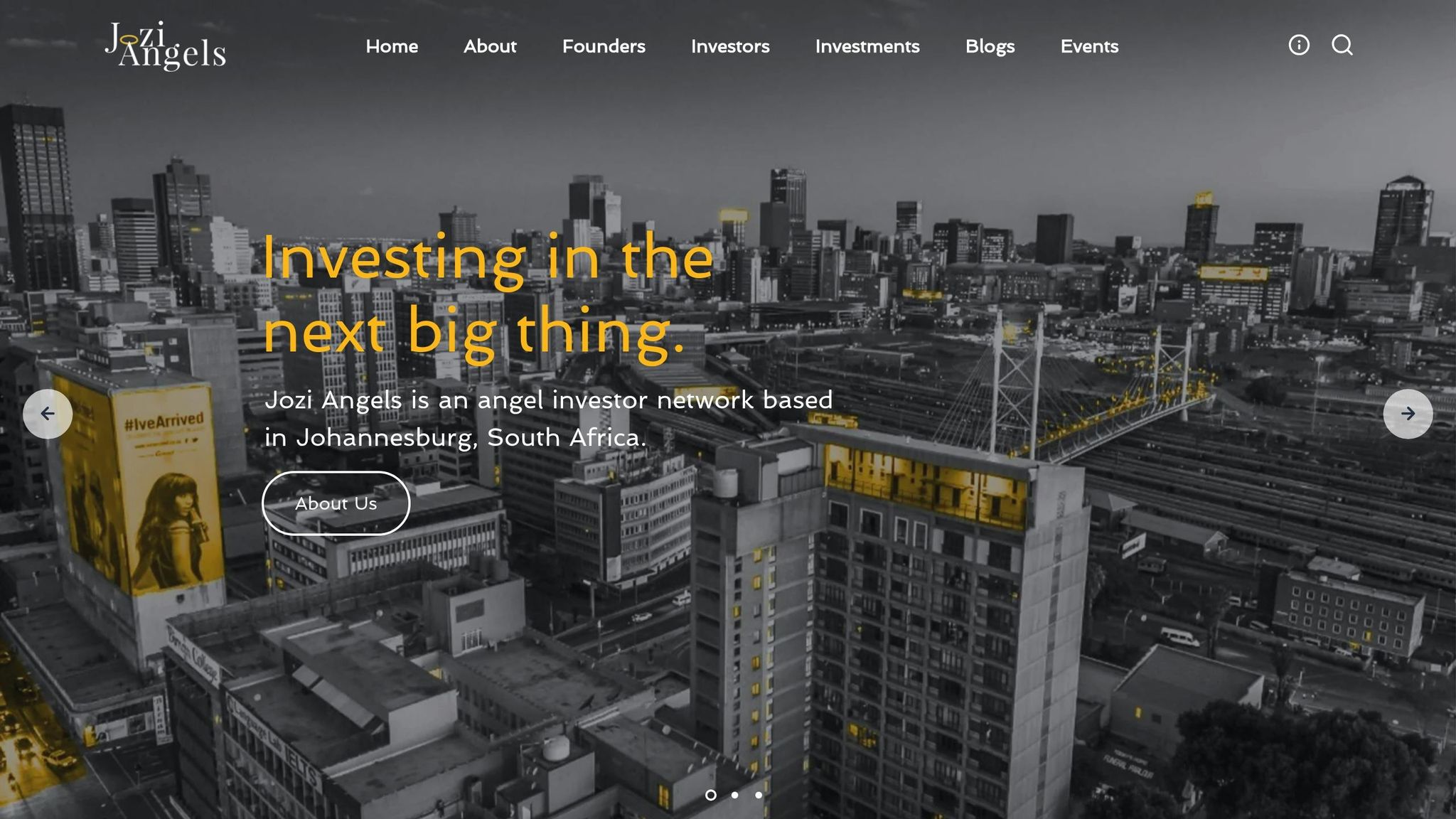
Jozi Angels is a community-focused group of angel investors dedicated to supporting early-stage startups in South Africa. By combining funding, expertise, and networking opportunities, it helps startups grow and succeed. With over $7.2 million invested across more than 50 startups, Jozi Angels has become a prominent player in the South African startup landscape [58,60]. Below, we’ll explore its investment approach, standout deals, and what makes it unique.
Investment Focus and Strategy
Jozi Angels specializes in seed-stage investments within South Africa, with an average funding round of $792,000. Over the last five years, it has completed four investments. The group prioritizes startups with strong teams tackling substantial market opportunities, placing less weight on initial valuations. This approach aligns with broader trends in Africa’s growing tech ecosystem. Its portfolio covers a variety of sectors, including enterprise software, HealthTech, consumer products, retail, and the gig economy. Individual angel investors in the network typically contribute between $33,000 and $660,000 (R50k to R1m) per company, with syndicate minimums starting at $33,000 (R50k).
Notable Portfolio Companies and Deals
Jozi Angels’ recent deals highlight its diverse and strategic investment approach. For example:
- The Awareness Company: In January 2025, this South African SaaS startup raised $1.6 million in a seed round. Jozi Angels joined forces with Next176, Catalyst Fund, and E-squared to back the company’s AI-powered sustainability platform.
- TUNL: In October 2024, Jozi Angels invested in this Cape Town-based logistics platform. TUNL offers innovative shipping solutions for e-commerce exporters, including features like auto-generated labels and branded tracking to boost conversions and customer loyalty.
- Contro: This telepharmacy startup secured $585,000 in November 2022 to expand its services, which include virtual doctor consultations and medication delivery for sexual health needs like birth control and STD treatments.
- LocumBase: Back in December 2020, Jozi Angels supported this platform that connects doctors with locum job opportunities across South Africa [56,58].
Market Impact and Vision
Jozi Angels stands out for its commitment to forming lasting partnerships with entrepreneurs, offering more than just financial backing. The fund’s mission is summed up in statements like:
“We exist to make funding more accessible for early-stage startups and to develop this lucrative asset class for investors.”
“We are a community of investors, marrying syndicates to exceptional founders building game changing solutions.”
This philosophy underscores its role as a catalyst for both startup growth and investor engagement.
How to Connect with Jozi Angels
For entrepreneurs seeking funding, Jozi Angels looks for strong teams with a solid market vision. The group operates as an exclusive network, open only to vetted investors. Startups need to present clear business plans and demonstrate their potential, as Jozi Angels collaborates closely with founders to help them succeed. With a goal to build a portfolio of over 20 startups, the group is particularly interested in enterprise, HealthTech, and consumer-focused companies that can benefit from both funding and mentorship. This selective approach reinforces Jozi Angels’ reputation as a driving force in South Africa’s startup ecosystem.
sbb-itb-dd089af
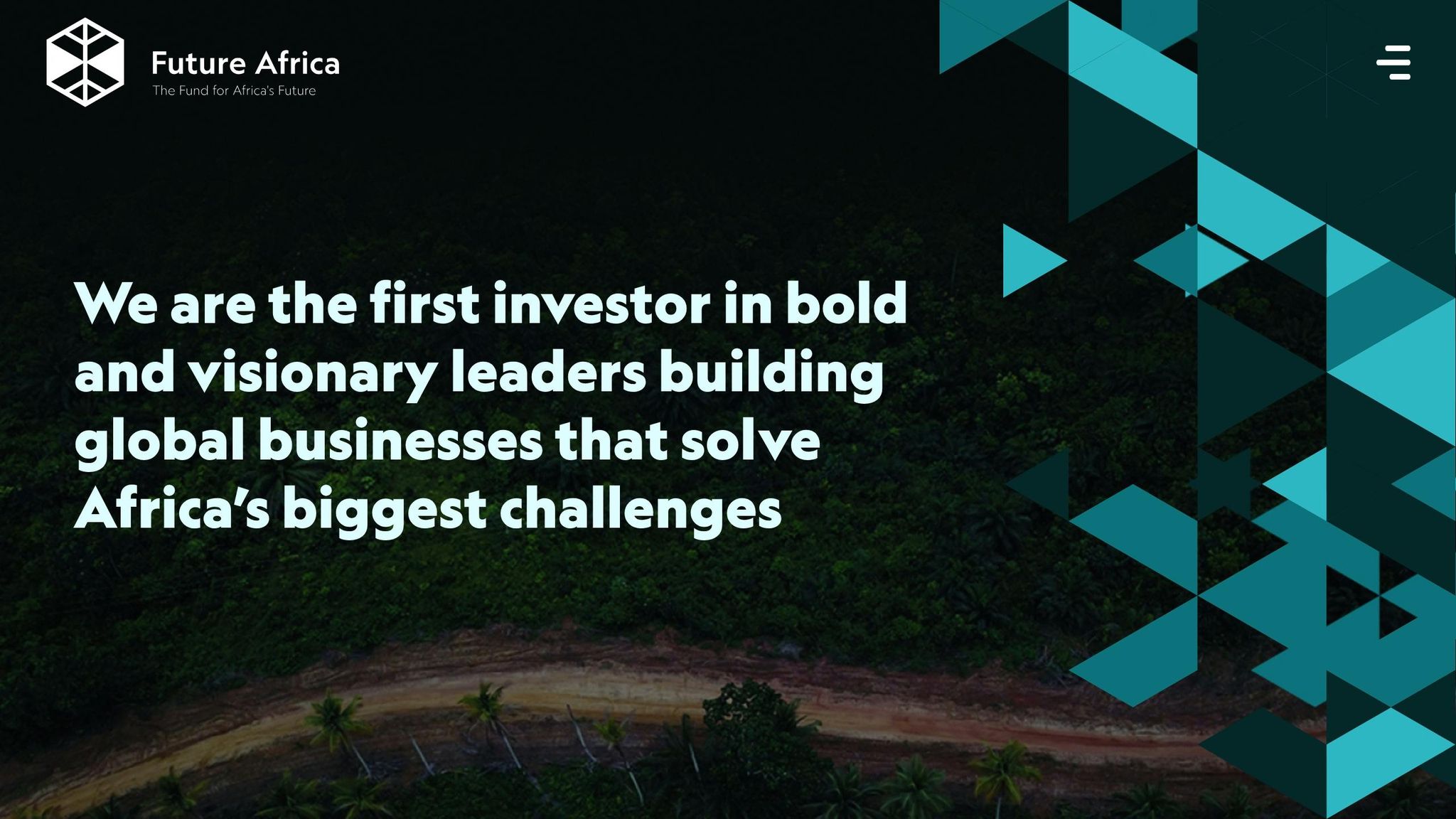
Future Africa is a mission-driven venture capital fund that provides capital, coaching, and community support to help African entrepreneurs succeed. With an investment of about $4 million across 45 startups, the fund has made a considerable impact by driving follow-on funding and creating jobs. Collectively, its portfolio companies have raised over $350 million in follow-on funding, reached valuations of more than $1.5 billion, and generated over 5,000 jobs across the continent. Let’s take a closer look at how Future Africa supports early-stage startups through its strategic investments.
Investment Focus and Strategy
Future Africa’s investment strategy is guided by the TIME framework, which prioritizes the Technology, Infrastructure, Media, and Environment sectors. The fund focuses on pre-seed and seed-stage companies that use technology to address Africa’s most pressing challenges while building businesses with global reach.
Their approach includes writing checks ranging from $25,000 to $500,000 for early-stage startups. This strategy aligns with emerging trends, such as the rise of ClimateTech, which surpassed FinTech as Africa’s most-funded sector, raising $413.9 million in 2024 alone. Future Africa’s emphasis on environmental solutions places it in a strong position within this growing sector.
Notable Portfolio Companies and Deals
Future Africa’s portfolio reflects the breadth and impact of African innovation:
- Andela: This company has created a network of 100,000 technologists across 110 countries, reduced recruiting time by 70%, and achieved unicorn status as one of Africa’s first billion-dollar companies.
- Moove: A mobility fintech focused on vehicle financing for gig workers, Moove operates in 13 cities across three continents. It has financed thousands of vehicles, facilitated over 15 million trips, and reduces carbon emissions by saving more than 25,000 MTCO2e annually through sustainable transportation.
- Releaf: In the agricultural technology space, Releaf’s proprietary hardware, Kraken, processes palm nuts 25 times faster than traditional methods. To date, the company has processed 10 million kg of palm nuts and digitized over 2,000 smallholder farms, advancing agricultural productivity in Africa.
- Flutterwave: A standout success, Flutterwave exited Future Africa’s portfolio in 2021. The payments giant processes over 500,000 transactions daily across 33 African countries and supports more than 1 million businesses, illustrating the fund’s ability to identify and nurture market leaders.
Market Impact and Vision
Future Africa goes beyond providing capital by offering operational expertise, as highlighted by their guiding philosophy:
“We invest in people solving Africa’s biggest challenges.”
“We are not just investors. We are operators with decades of experience building and investing in some of Africa’s most impactful businesses.”
This hands-on approach is particularly valuable in rapidly growing sectors. For example, with Africa’s electricity demand projected to grow by 75% by 2030, and the continent’s food and agriculture market expected to expand from $280 billion to $1 trillion by 2030, Future Africa’s portfolio is well-positioned to seize these opportunities.
How to Connect with Future Africa
Entrepreneurs interested in working with Future Africa have several ways to connect. The most straightforward method is through their Future Africa Fund application form. Founders can also reach out via email or seek introductions through mutual connections.
Applicants need to have a Minimum Viable Product and a technical co-founder. The application process involves a six-week review, followed by meetings, due diligence, and final funding decisions. Future Africa evaluates startups using its TD3 framework – Talent, Design, Data, Distribution – before moving to the closing and funding stage.
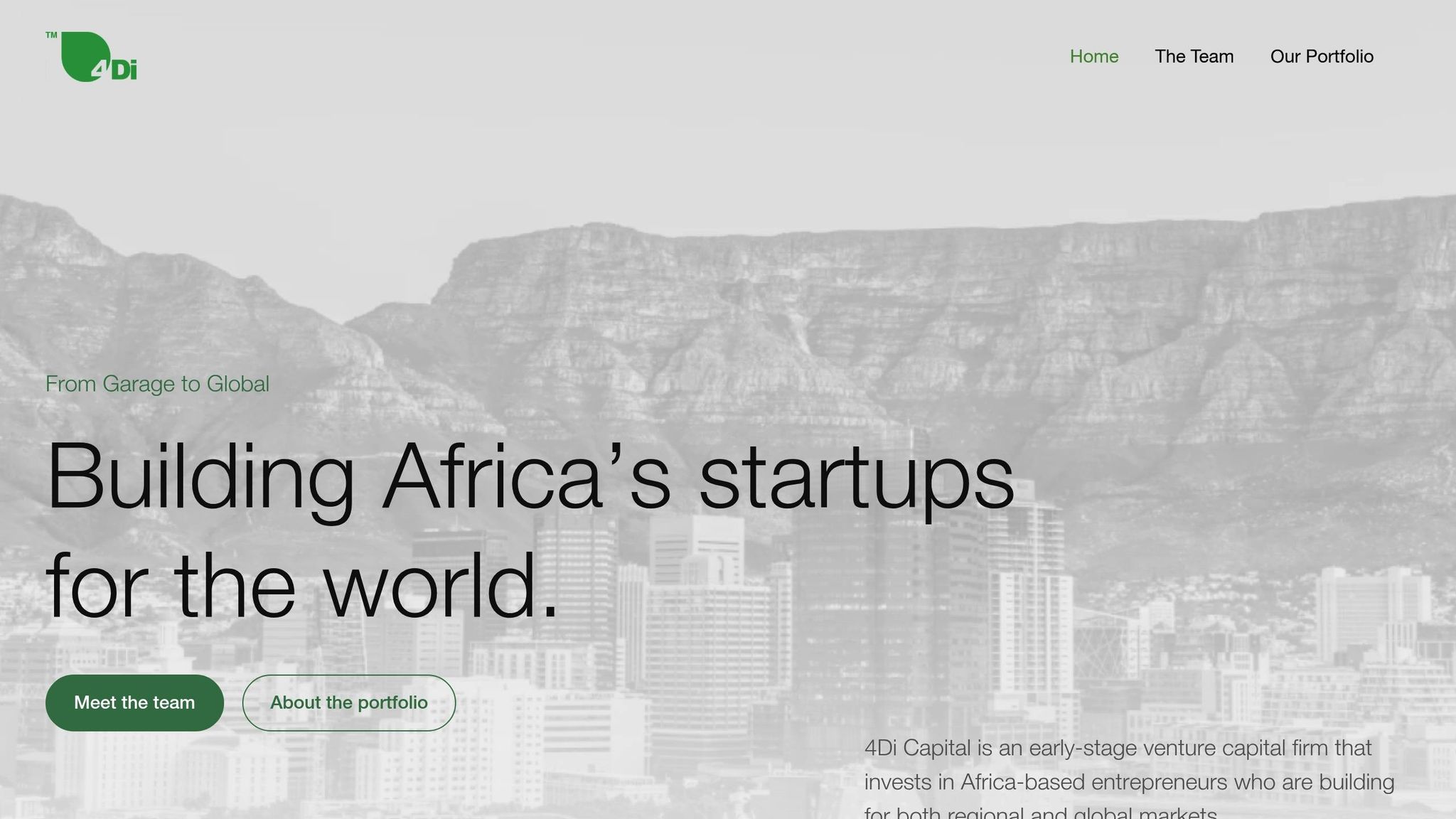
4Di Capital is a venture firm dedicated to supporting early-stage tech startups across Africa. With $37 million invested through two funds and a portfolio of over 50 companies in more than 15 African countries, the firm has become a prominent name in the region’s startup ecosystem.
Investment Focus and Strategy
The firm focuses on seed and early-stage startups tackling significant market challenges in mobile, enterprise software, and web sectors. Their primary interest lies in scalable opportunities within FinTech, HealthTech, and InsureTech.
What sets 4Di Capital apart is their philosophy of “nurture capital”, which emphasizes mentorship and network access alongside funding. As they explain:
“Nurture capital is the term that best describes 4Di Capital’s purpose and philosophy. We understand that in the early days of any business, support, mentoring and access to networks is just as important as seed capital.”
This hands-on approach is particularly suited to the needs of African startups, where expertise and connections can be just as transformative as financial backing.
Notable Portfolio Companies and Recent Investments
4Di Capital’s investments highlight their commitment to fostering innovation across diverse sectors. Some of their recent and notable investments include:
- Happy Pay: In September 2024, 4Di Capital led a $1.81 million seed round for this South African fintech, joined by Gaingels and Launch Africa.
- VALR: They participated in a $3.4 million Series A round in July 2020 and later in a $50 million Series B round in February 2022 for this South African cryptocurrency exchange.
- Sendmarc: In February 2023, the firm joined a $7 million Series A round for this email security company based in South Africa.
- VendEase: Back in March 2021, 4Di Capital invested $125,000 in this Nigerian B2B food and retail marketplace during its seed stage.
These investments underscore their focus on startups with scalable solutions and strong market potential.
Investment Criteria and Team Philosophy
4Di Capital places a strong emphasis on the quality of founding teams and their understanding of the market. They state:
“We look for founder teams with passion, commitment, domain expertise, and deep market insights into the large market problems they wish to solve with their technology solutions.”
This focus on founder-market fit reflects their belief that startups need both local expertise and global ambition to succeed in Africa’s dynamic markets.
How to Connect with 4Di Capital
Entrepreneurs interested in working with 4Di Capital can reach out through the “Let’s Talk” feature on their website. To stand out, founders should clearly outline the problem they are solving, demonstrate their team’s expertise, and highlight their business model’s potential for growth and scalability. Since 4Di Capital values mentorship and network access, founders who seek more than just funding are likely to find a good fit with their approach.
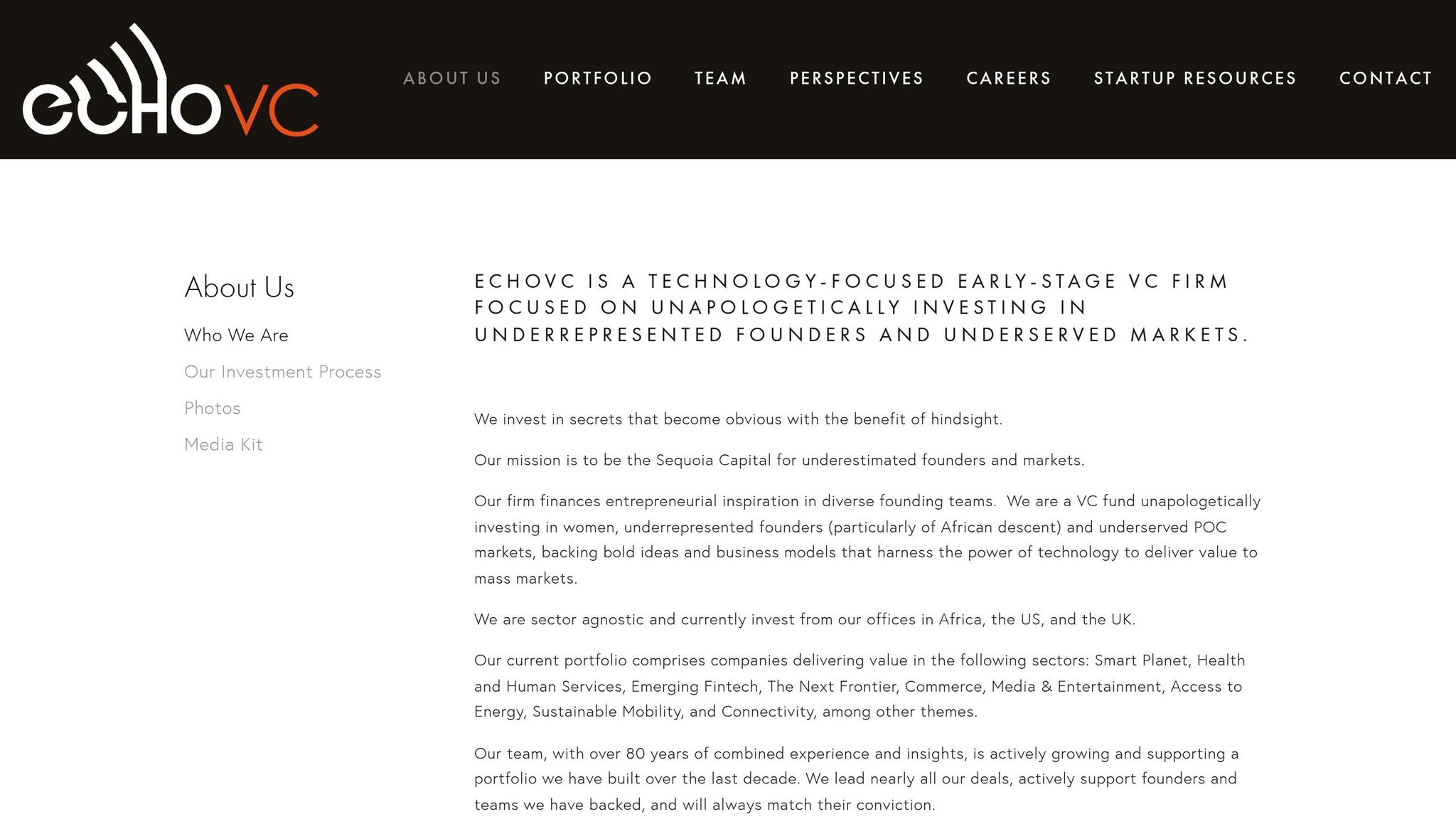
EchoVC Partners is a key player in Africa’s growing venture capital ecosystem, focusing on tech-driven solutions from underrepresented founders and underserved markets. With a portfolio of 98 companies and over $47.4 million invested in African startups, the firm is making waves across the continent’s entrepreneurial landscape.
Investment Philosophy and Sector Focus
EchoVC Partners takes a broad approach, centering its strategy on backing founders and markets often overlooked by traditional investors. The firm describes its mission as:
“Our mission is to be the Sequoia Capital for underestimated founders and markets.”
Their investments span several sectors, including Smart Planet, Health and Human Services, Emerging Fintech, Commerce, Media & Entertainment, Access to Energy, Sustainable Mobility, and Connectivity. This wide-ranging focus is evident in their portfolio, which includes 89 tech companies, 65 enterprise (B2B) firms, 52 software businesses, and 39 consumer-focused (B2C) ventures.
To address specific challenges, EchoVC has launched targeted funds. For example, its Eco Pilot Fund I supports initiatives in climate, energy, agriculture, and mobility, while EchoVC Chain is dedicated to blockchain-related opportunities. The firm has already invested in 14 climate-focused startups across Africa.
Notable Portfolio Companies and Investment Activity
EchoVC has built a diverse portfolio across key African markets, including Nigeria, Kenya, Uganda, and South Africa. Some standout investments include seed funding for Payhippo ($2 million, March 2025) and a Pre-Series A round for Rivy ($4 million, March 2025). Other notable companies in their portfolio include eBanqo, Eze, VendEase, and KOSA AI.
The firm’s success stories include QuickBus, which was acquired in April 2024. Additionally, companies like Hotels.ng, Gro Intelligence, and LifeBank continue to make a strong impact in their respective industries.
Investment Criteria and Funding Approach
EchoVC focuses on early-stage investments, ranging from seed to Series A/B rounds, with funding amounts between $25,000 and several million dollars. The firm often leads its deals and works closely with founders to provide hands-on support.
Eghosa Omoigui, the Managing Partner, emphasizes the importance of a broad investment strategy for Africa’s development:
“Africa’s golden age of entrepreneurship, job creation and household lift will demand that mission-driven founders be backed by high-risk capital. Africa’s needs, while diverse, will not be solved only by investments in fintech.”
This philosophy is evident in their investments in companies like Gro Holdings, Beacon Power Services, Shuttlers.NG, Complete Farmer, and Senga, which tackle challenges in climate, agriculture, energy, and transportation. Their multi-sector approach reflects the continent’s dynamic and diverse venture capital landscape.
How to Connect with EchoVC Partners
EchoVC actively seeks startups with scalable business models, particularly those led by underrepresented founders. Entrepreneurs looking to secure funding should align their ventures with EchoVC’s focus areas, such as energy access, Smart Planet solutions, Health and Human Services, Emerging Fintech, and Sustainable Mobility.
With offices in Africa, the United States, and the United Kingdom, EchoVC has built a global presence while remaining committed to supporting African startups. Their portfolio companies collectively employ over 2,000 people across 12 countries, and the firm has generated returns exceeding $21 million. For founders with bold ideas and a vision for growth, EchoVC offers a pathway to scale and success.
VC Fund Comparison Table
Choosing the right venture capital (VC) partner can make or break a startup’s journey. With numerous active funds across Africa, entrepreneurs need a concise way to understand what each fund offers. Below is a detailed table summarizing the profiles discussed earlier, providing a quick reference to guide strategic investor decisions.
| VC Fund | Primary Sectors | Investment Stage | Geographic Focus | Notable Portfolio Companies |
|---|---|---|---|---|
| Partech | Internet, Information Technology | Early to Growth Stage | Pan-African | Enter, Mercanis, Makersite |
| Future Africa | Financial Services, FinTech, IT | Seed to Series A | Nigeria, Kenya, Ghana | Moove, Juicyway, Filmmakers Mart, Akiba Digital, Anchor, Bamboo |
| 4Di Capital | Software, Financial Services, Mobile | Seed to Series B | South Africa, East Africa | Maxe AI, Cloudline, Happy Pay |
| EchoVC Partners | Information Technology, Software, E-Commerce | Seed to Series A/B | Nigeria, Kenya, Uganda, South Africa | Rivy, Shuttlers, Snowstorm |
| Savannah Fund | E-Commerce, FinTech, IT | Pre-Seed to Series A | Sub-Saharan Africa | Oze, Root, Afropolitan |
| Kepple Africa Ventures | Financial Services, FinTech, IT | Seed to Series A | East & West Africa | Chari, Intmax, Carry1st |
| TLcom Capital Partners | Software, Mobile, IT | Series A to B | Nigeria, Kenya, Egypt | Hub2.Io, Educatly, littlefishapp |
| GreenHouse Capital | Financial Services, FinTech, Payments | Seed to Series A | Nigeria, Ghana | Credpal, Encore Pay, MarketForce |
| Ingressive Capital | Financial Services, FinTech, IT | Pre-Seed to Seed | Nigeria, Kenya | MNZL, Oze, Nowlun |
| Golden Palm Investments | Information Technology, FinTech, Logistics | Seed to Series A | West Africa | Sabipay, Maplerad, Jetstream Africa |
Key Trends in Africa’s VC Landscape
Analyzing this table reveals some clear patterns in Africa’s venture capital ecosystem:
- FinTech Leads the Way: The dominance of FinTech aligns with broader trends, as FinTech, ClimateTech, AI, E-Commerce, and Supply-Chain Tech accounted for 94% of tech deals in Q1 2025.
- Geographic Focus: Nigeria and Kenya emerge as key hubs, with South Africa also well-represented among funds targeting more established markets. These regions are home to Africa’s largest tech ecosystems.
- Investment Stage Focus: Different funds specialize in varying stages of growth. For example, Ingressive Capital focuses on pre-seed and seed rounds, while TLcom Capital Partners targets Series A and B. This creates a funding pipeline that supports startups at different phases of their journey.
- Portfolio Philosophy: Each fund’s portfolio reflects its strategy. EchoVC Partners’ investments highlight a broad sector approach, while Future Africa’s portfolio emphasizes financial and IT services.
- Sector Strategies: Some funds, like GreenHouse Capital, focus narrowly on payments and financial services, while others, such as EchoVC Partners, take on a wider range of industries, showcasing different approaches to risk and opportunity.
What This Means for Entrepreneurs
For entrepreneurs, aligning with the right investor is key. A FinTech startup in Lagos, for instance, might find several potential partners, while a ClimateTech venture may need to seek out more specialized investors.
The funding landscape also reveals shifts in opportunities. Seed-stage investments grew by a third in both volume and value during Q1 2025, while late-stage rounds were notably absent for the second consecutive first quarter. For startups, this underscores the importance of building strong fundamentals to attract early-stage and Series A funding, as late-stage opportunities remain elusive.
Conclusion
The venture capital landscape in Africa in 2025 brings both challenges and opportunities for entrepreneurs. In 2024, African startups raised $2.8 billion across 750 deals – a notable 28% drop from the $3.9 billion raised the year before. This decline means founders must adapt to a more selective and demanding funding environment.
Success in this shifting market depends on a deep understanding of its nuances. Tosin Eniolorunda, CEO of Moniepoint, shared his perspective:
“Moniepoint never benefited from the VC market hype, so we’ve needed to raise capital gradually in smaller amounts, and always on the basis of business fundamentals. I’ve always been focused on building a business that is profitable and does not rely on external funding to survive.”
This sentiment highlights a growing emphasis on business fundamentals. Startups are now expected to focus on sustainable growth rather than chasing rapid scaling. With 65% of VC-backed companies failing to return their capital, investors are scrutinizing startups more closely. Founders must demonstrate strong unit economics, transparent financial practices, and viable business models from the start.
Choosing the right investors is also becoming more important. Emenike Olome, CEO of Rabbit Africa, underscored this point:
“I’d rather take $500k from someone who can introduce me to Meta, than $1M from someone who just writes a cheque.”
This approach emphasizes the value of partnerships that go beyond funding – investors who can provide market access, expertise, and strategic connections are critical as market conditions evolve.
Emerging sectors continue to offer promise. Fintech remains dominant, while AI and climate tech are gaining momentum. Corporate venture capital is playing a larger role, and strategic mergers and acquisitions are increasingly preferred over IPOs as exit strategies.
For founders navigating this environment, staying informed is key. Platforms like Tech In Africa provide valuable insights into funding trends, investor priorities, and sector-specific opportunities. With only 26 venture-backed exits recorded in Africa in 2024, understanding the entire funding lifecycle – from pre-seed to exit – has never been more important.
The road ahead demands discipline and adaptability. Entrepreneurs who build resilient businesses grounded in strong fundamentals and stay attuned to market shifts will be better positioned to secure funding and achieve sustainable growth in Africa’s evolving venture capital scene.
FAQs
What led to the recovery of venture capital funding in Africa in 2025 after the slowdown in 2024?
The rebound of venture capital funding in Africa in 2025 was driven by a mix of economic improvements and strategic shifts. Falling inflation rates and lower interest rates brought stability to markets, while better overall economic conditions helped rebuild investor confidence. At the same time, lenders began prioritizing high-caliber startups, sparking renewed interest in both equity and debt financing.
Africa’s growing tech and innovation ecosystems also played a major role. Investors were increasingly drawn to the region’s promising long-term growth, particularly in thriving sectors like fintech, healthtech, and agritech. This wave of optimism marked a sharp recovery from the funding struggles experienced in 2024.
How are local investors and specialized funds driving growth in Africa’s startup ecosystem?
Local Investors and Specialized Funds in Africa’s Startup Ecosystem
In 2025, local investors and specialized funds are proving to be key players in shaping Africa’s startup scene. By providing targeted funding, they’re enabling startups to secure the capital needed to grow and bring fresh ideas to life. Many of these investors, including banks and organizations with a focus on social impact, are offering loans and credit support to businesses in areas like technology and infrastructure. This financial backing is playing a big part in driving development across the continent.
Specialized funds are also making waves by zeroing in on specific industries and regions often overlooked by traditional funding sources. This strategy is helping startups in less-represented areas expand their reach, which is building a more varied and robust entrepreneurial environment. These initiatives aren’t just encouraging innovation – they’re also opening doors for local and regional economic advancement.
What do top African VC funds look for in startups, and how can founders improve their chances of getting funded?
Top African VC Funds: What They Look For
African venture capital funds tend to back startups tackling real, pressing issues – especially those deeply rooted in local communities. They’re drawn to industries with high growth potential, scalable business models, and teams that demonstrate expertise and unwavering dedication.
If you’re aiming to secure funding, make sure your startup shows a clear and convincing problem-solution fit and operates in a sector poised for growth. Emphasize your team’s strengths, such as relevant experience and a proven ability to deliver results. A well-researched business plan with detailed financial projections and a clear scaling strategy is essential. Additionally, building genuine relationships with investors and showcasing measurable progress can go a long way in making your startup stand out.
Related posts
/* Shares”}};
/* ]]> */




















